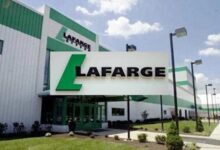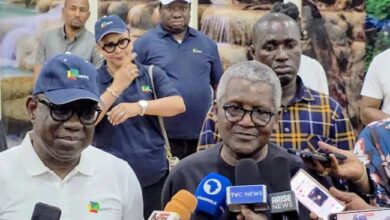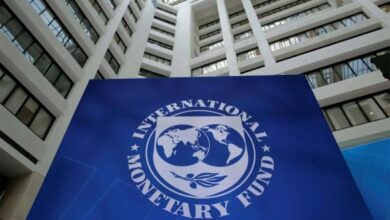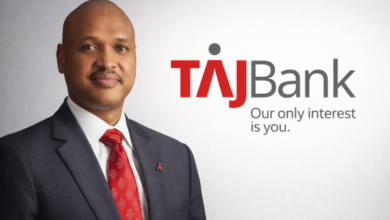Nigeria Owns 2.2 percent of World Oil Reserves says Maikanti Baru
 The former Group Managing Director, Nigeria National Petroleum Corporation (NNPC), Dr. Maikanti Baru, on Tuesday, said that Nigeria holds about 2.2 per cent of the global oil reserves.
The former Group Managing Director, Nigeria National Petroleum Corporation (NNPC), Dr. Maikanti Baru, on Tuesday, said that Nigeria holds about 2.2 per cent of the global oil reserves.
Baru disclosed this while delivering the keynote address at the official opening of the 2019 Nigeria Oil & Gas Conference and Exhibition holding in Abuja, with the theme: “Promoting Investment & Collaboration in Nigeria’s Oil Gas Industry.”
According to Baru, the country’s crude has been growing steadily, noting that it grew from 22 billion barrels in 1999 to 37.5 billion in 2018.
He said that Nigeria is only behind Lybia in crude oil reserves in Africa, adding that the country’s crude oil production is currently between 2.2 and 2.3 million barrels of crude per day, following the coming onstream of the Egina Field, which produces 200, 000 bopd.
On gas, he said that the country is now the 9th largest gas reserves countries in the world with a 2P gas reserve of 201 trillion cubic feet (Tcf), upside potential of about 600 Tcf, gas production and utilisation average of about 8.4 bscfd, domestic consumption of 18 per cent, 43 per cent exportation of LNG, while 32 per cent is re-injected for enhanced oil recovery.
“Nigeria holds about 2.2% of global oil reserves. Our crude oil reserves have grown steadily from about 22billion barrels in 1999 to 37.5billion barrels in 2018. Nigeria is home to the second largest crude oil reserves in Africa after Libya. Our crude oil production currently hovers around 2.2 -2.3 million bocpd. This was bolstered by the coming onstream of the Egina Field in December 2018 and which has currently ramped up to 200,000bopd.
“On the gas side, we have the 9th largest gas reserves in the World with a 2P gas reserves of 201Trillion cubic feet (Tcf) and an upside potential of about of 600Tcf. In terms of gas production and utilization, Nigeria averages about 8.4bscfd. While only 18% of the production is consumed in the domestic market (Power, Industries and WAGP), 43% is exported as LNG, 32% is re-injected for enhanced oil recovery and other operational uses like fuel gas while 7% of total gas production is currently being flared,” he said.
He noted that the reserve numbers that the country has will not be relevant if it’s not driven by investment in a sustainable and collaborative manner.
Baru informed that Nigeria is the largest producer of oil & gas in Africa, stating that the country accounts for $48.04 billion of the $194 billion surge in capital expenditure coming into upcoming oil and gas development on the African continent from 2018 to 2025. On the relevance of crude oil to the country’s economy, he noted that the industry remains the bedrock of a robust economic growth of the country.
He said, “These resources or reserve numbers on their own mean nothing except we drive investment in a sustainable and collaborative manner. This has been the thrust and focal point of our drive over the past three years at NNPC and we appreciate the goodwill and support we have enjoyed from all.
“Currently, Nigeria is a leading Oil and Gas producer in Africa. The Nation’s energy outlook appears very positive even amidst the difficult operating and economic headwinds across the continent. It is also significant to state that out of about $194billion surge in the Capital Expenditure coming into upcoming oil and gas development on the African continent from 2018 to 2025, Nigeria today accounts for $48.04billion (over 24.8%) with other African countries sharing the rest.
“For Nigeria therefore, oil and gas remain essential building blocks for our economic growth, particularly as a developing Country. There is, therefore, no gain saying the fact from the Upstream, Midstream and Downstream sub-sectors, the Nigerian Oil and Gas Industry is replete with massive investment opportunities.”
Speaking on the challenges facing the oil and gas sector and what the NNPC is doing to address them and take advantage of the opportunities that lie in oil and gas sector, he said that the national company has undertaken a paradigm shift in their business model to attract capital and sustain flow of investment “with a special emphasis on local refining.”
“To encourage the existing players in the Industry particularly the traditional JV partners, NNPC undertook to settle all outstanding cash call arrears amounting to $5billion in 2015. Till date, we have defrayed over $2billion. All these efforts are geared towards sustaining investment and renewing investor confidence,” he added.
Between 2015 and 2017, he said that the NNPC was involved in various “project financings of over $3Billion in new investment capital.”
Baru added that this year’s edition of NOG Conference and Exhibition comes with mixed feelings for him personally because he will be retiring from the national company and thanked the CWC, the organisers of the conference, for their steadfastness.
Source: Nigerian NewsDirect
Samson Oyedeyi












